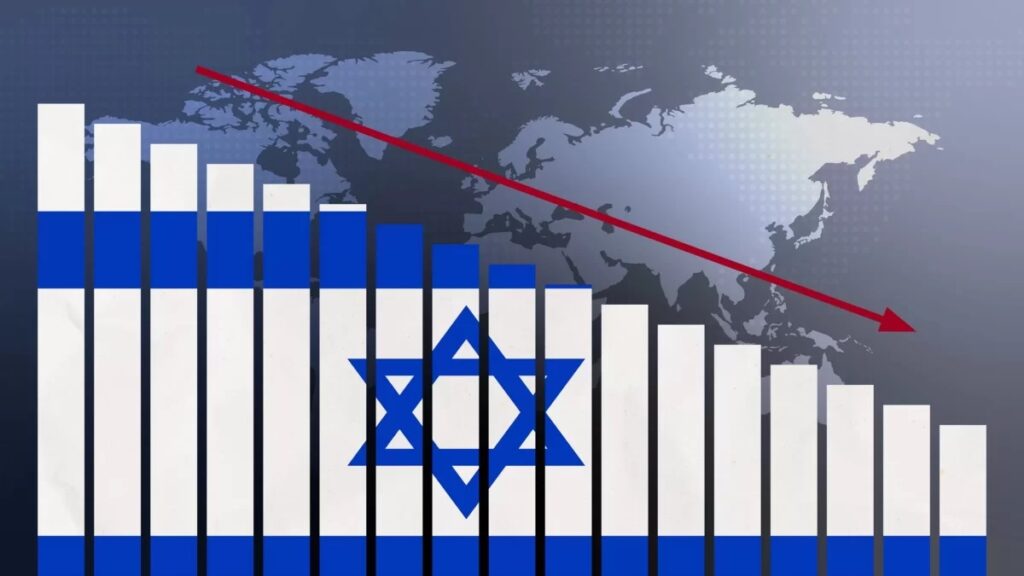Israel’s Budget Deficit in 2024: A Record Gap Between Finance Ministry and CBS Reports
A 29.5 Billion Shekel Discrepancy Raises Questions About Transparency and International Recognition.

Watan-The gap between the deficit reported by Israel’s Ministry of Finance, led by Finance Minister Bezalel Smotrich, and the deficit reported by the Central Bureau of Statistics (CBS) surged significantly in 2024, reaching 29.5 billion shekels ($8.3 billion), according to the Israeli financial news site “Calcalist.” This massive discrepancy is attributed to what the site calls a “trick” by the Ministry of Finance in calculating the deficit.
In 2023, the deficit stood at 18.1 billion shekels (with the exchange rate at 3.55 shekels per dollar) in favor of the CBS, which reported a higher deficit. In 2023, the Accountant General of the Ministry of Finance reported a deficit of 4.2% of GDP, whereas the CBS reported a deficit of 5.1% of GDP.
Israel’s Budget Deficit: Highest in the West, Says CBS
This gap widened further last year: The Ministry of Finance reported a deficit of 6.9% of GDP, while the CBS reported a deficit of 8.3% of GDP. Over 2023 and 2024 combined, the cumulative deficit reached 48 billion shekels, equivalent to approximately 2.3 percentage points of GDP.
Yesterday, the CBS presented a table showing that Israel’s budget deficit in 2024 is the highest in the Western world. These discrepancies have raised questions about which figures international economic institutions—especially the two most significant ones, the International Monetary Fund (IMF) and the Organization for Economic Cooperation and Development (OECD)—will reference.
According to Calcalist, the answer is unequivocal: Only the figures reported by the CBS will appear in the upcoming reports by these institutions for 2024. Calcalist also learned that an IMF delegation visited the CBS last month and was particularly interested in the gap that had already emerged in 2023. The IMF confirmed that it would refer exclusively to the figures provided by the CBS.

The Finance Ministry’s “Trick” in Calculating the Deficit
The IMF has confirmed that the calculation method used by Israel’s Ministry of Finance is unacceptable and does not comply with international standards. Following these significant discrepancies and the response from international organizations, officials from the Treasury contacted CBS officials to understand and clarify these gaps, as publishing a deficit that does not meet international standards could undermine confidence in the ministry.
According to information obtained by Calcalist, the largest gap between the calculations last year—16 billion shekels—was due to the method of recording interest on debt. There are two major differences in how interest expenses (which are always recorded as budget expenditures and thus contribute to the deficit) are accounted for:
-
-
The CBS records interest on an accrual basis rather than a cash basis, meaning it calculates interest for each year, even if no coupon is paid on a bond that year.
- Example: The Israeli government issued a zero-coupon bond to finance the war with a ten-year maturity. The Treasury does not count interest until the bond matures in ten years, whereas the CBS accounts for it annually.
-
-
-
The CBS also includes linkage differences (inflation adjustments, which were very high in 2024), while the Ministry of Finance does not. The IMF requires interest to be recorded on an accrual basis, including these linkage differences.
-

Another discrepancy of 8.3 billion shekels arose from a category the CBS calls “sub-sectors.” The Ministry of Finance only accounts for the government’s deficit, whereas the IMF requires the inclusion of deficits from non-governmental public entities, such as the National Insurance Institute, health funds, universities, and other public non-profit institutions.
Additionally, the IMF distinguishes between the general government balance, which includes local governments, and the central government balance. The CBS calculates the general government deficit (which amounts to 8.3% of GDP). These two factors alone explain more than 82% of the gap.
Another significant factor is the Compensation Fund. The Treasury classified this fund as off-budget, meaning it records revenues but does not count the fund’s expenditures as contributing to the deficit, thereby reducing the reported deficit. However, the CBS, following IMF guidelines that do not accept this “trick,” records both revenues and expenditures, which increases the reported deficit. This resulted in an additional discrepancy of 6.4 billion shekels.






